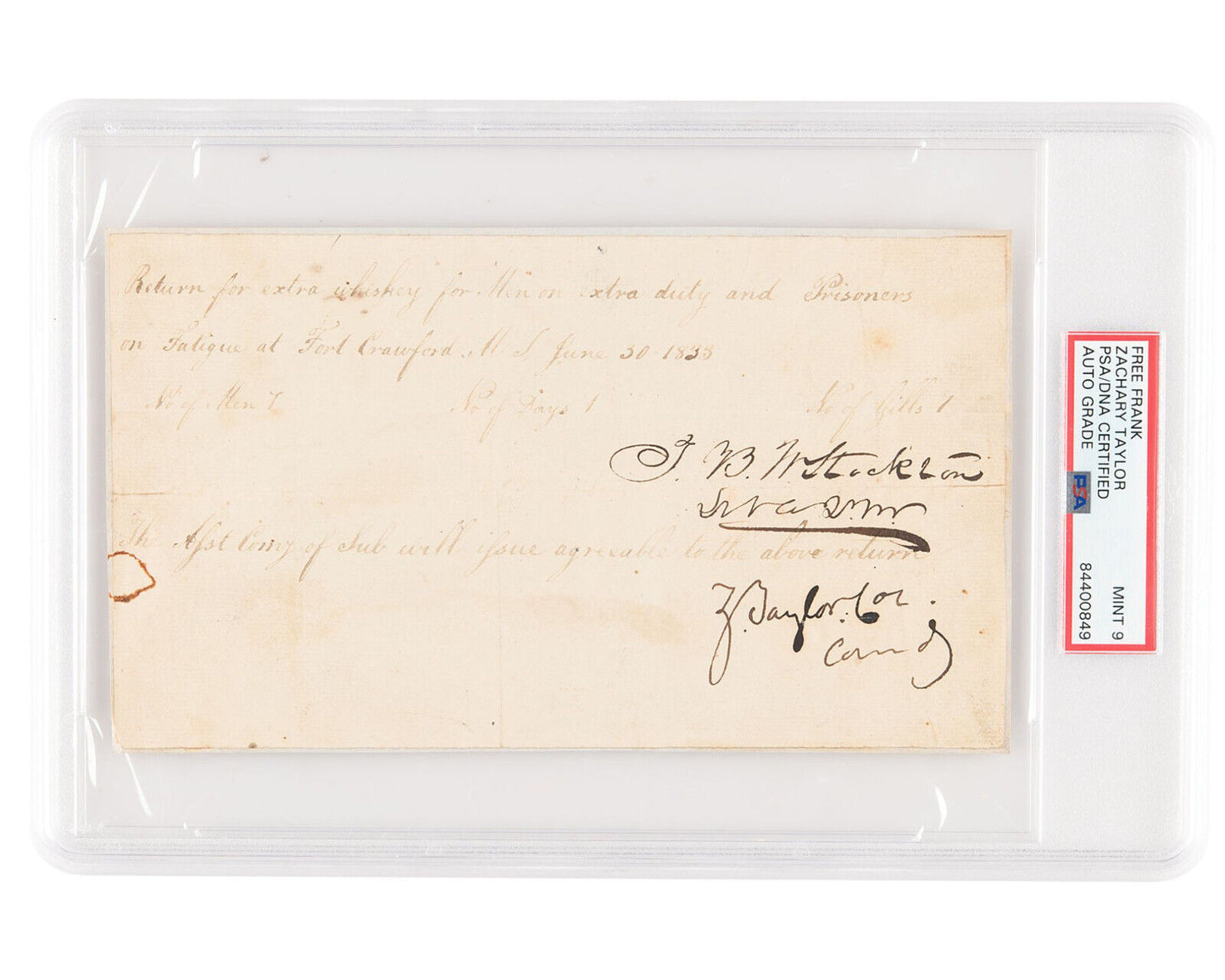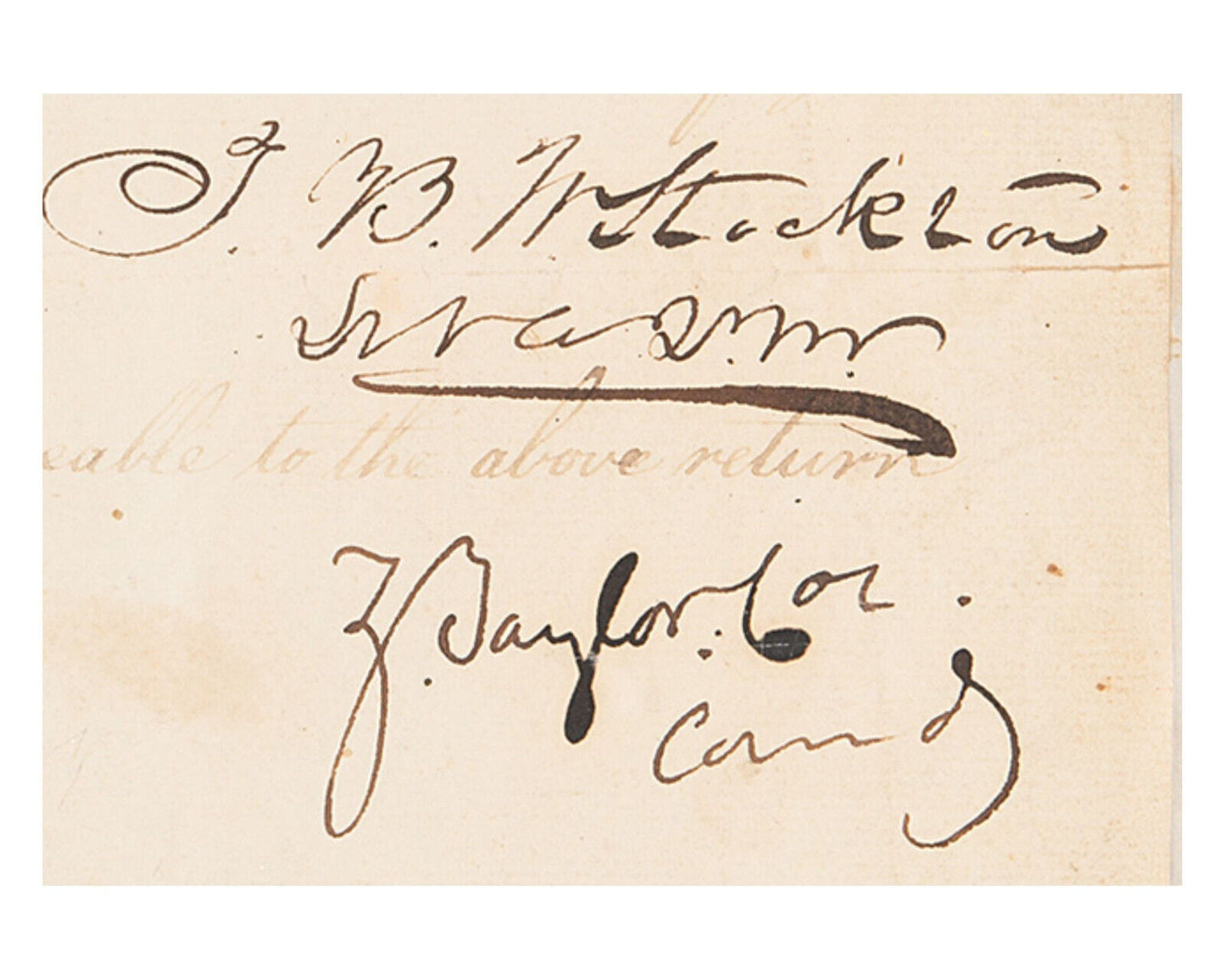President Zachary Taylor Signed Doc for Black Hawk War Whiskey Rations PSA 9
President Zachary Taylor Signed Doc for Black Hawk War Whiskey Rations PSA 9
Couldn't load pickup availability
Zachary Taylor Signed Military Document Approving Extra Whiskey Rations – Fort Crawford, 1833 – PSA/DNA MINT 9
This historically significant military document, signed by Zachary Taylor as Colonel commanding Fort Crawford, authorizes extra whiskey rations for soldiers performing extra duty and prisoners on fatigue labor. Dated June 30, 1833, and measuring 7.5 x 4.25 inches, the manuscript reads: "Return for extra whiskey for Men on extra duty and Prisoners on Fatigue at Fort Crawford, M.T." The document is boldly signed at the conclusion by Taylor, reading "Z. Taylor, Col. Comd’g." The request reflects a common military practice of issuing whiskey as sustenance and morale support for troops engaged in arduous tasks.
The document remains in fine condition, with only minor signs of wear, and has been affixed to a same-size sheet for preservation. It has been encapsulated and authenticated by PSA/DNA, earning a MINT 9 grade, signifying its exceptional quality and the boldness of Taylor’s signature.
Zachary Taylor and Fort Crawford
At the time of signing, Zachary Taylor (1784–1850) was a seasoned U.S. Army officer stationed at Fort Crawford in Michigan Territory (now Wisconsin). The fort played a key role in securing the frontier, maintaining order among settlers and Native American tribes, and enforcing treaties following the Black Hawk War of 1832. Taylor's leadership during this period helped establish his reputation as a disciplined and pragmatic military commander, traits that would later define his role in the Mexican-American War (1846–1848).
Historical Context – The Black Hawk War and Military Governance in 1833
At the time this document was signed in June 1833, the Black Hawk War (1832) had recently concluded, and the U.S. Army was still engaged in securing the frontier and managing post-war affairs. The conflict, fought between the United States and the Sauk leader Black Hawk, was a brief but significant struggle over land rights in the Upper Midwest. Following the war, Fort Crawford became a key site for overseeing the surrender and relocation of Native American tribes, enforcing U.S. territorial claims, and maintaining military order in the region. Zachary Taylor, as commander of the fort, played an essential role in ensuring stability in the aftermath of the war, supervising military operations and overseeing the construction of a new fort structure. The issuance of extra whiskey rations to overworked troops and prisoners reflects the ongoing labor demands placed on the military during this critical period of U.S. expansion and frontier security.
Zachary Taylor’s Presidency and Legacy
Taylor’s military success in the Mexican-American War, particularly his victories at Monterrey and Buena Vista, catapulted him to national prominence, leading to his election as the 12th President of the United States in 1848. As president, he faced rising sectional tensions over the expansion of slavery into newly acquired territories. Though a Southern slaveholder, Taylor opposed the expansion of slavery, placing him at odds with many in the South. His unexpected death on July 9, 1850, just 16 months into his presidency, cut short what could have been a defining administration.
A Rare and Collectible Piece of American History
This document represents a rare glimpse into Taylor’s early military leadership, years before he became a national war hero and president. His signature remains bold and clear, making this an outstanding collectible for presidential and military history enthusiasts. With its PSA/DNA MINT 9 encapsulation, historical significance, and connection to Taylor’s career, this piece is a testament to the era of frontier military governance and the leadership of one of America’s most storied generals-turned-presidents.
Share


Join Our History Vault!
Be the first to discover rare artifacts, exclusive deals, and stories behind history’s greatest treasures.



